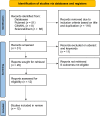A Systematic Scoping Review of Motivations and Barriers in COVID-19 Volunteering Among Health Students: The Potential for Future Pandemic Volunteers
- PMID: 37350985
- PMCID: PMC10284154
- DOI: 10.2147/JMDH.S411896
A Systematic Scoping Review of Motivations and Barriers in COVID-19 Volunteering Among Health Students: The Potential for Future Pandemic Volunteers
Abstract
Background: The high number of cases of COVID-19 has caused an increase in workload and a shortage of medical personnel in various countries, so volunteers are needed, such as health students. However, becoming a volunteer during a pandemic is influenced by motivational factors and barriers.
Purpose: This study aims to identify the motivations and barriers of health students as COVID-19 volunteers.
Methods: This study uses a systematic scoping review. A literature review was conducted using CINAHL, PubMed, and ScienceDirect databases. The study was eligible for inclusion if it included articles published from 2020 to 2022, full-text, and primary studies. Studies were excluded if they were not in English. The keywords used in English were "health students OR nursing students OR medical students" AND "motivation OR willingness" AND "Barriers" AND "volunteer OR volunteering OR volunteerism OR voluntary" AND "COVID-19 OR covid-19 OR SARS-CoV-2 OR COVID-19 pandemic". Study quality was assessed using the Joanna Briggs Institute (JBI) appraisal tool.
Results: We found 12 articles showing motivational factors and barriers among health students volunteering to control COVID-19. Motivational factors include domain values, understanding, enhancement, career, incentive, government, social, and demographics. In contrast, barriers include fear, lack of training and knowledge, PPE shortage, unpreparedness and role uncertainty, and lack of interest, support, and protection.
Conclusion: Our findings highlight that eight motivational factors and seven barriers influence health students' involvement in COVID-19 volunteering. However, to optimize the potential of health students, further preparation is essential to ensure that students can volunteer effectively, such as integrating volunteer training programs into the curriculum in preparation for future pandemic mitigation.
Keywords: COVID-19; barriers; health students; motivation; pandemic; volunteers.
© 2023 Susanti et al.
Conflict of interest statement
The authors declare no conflicts of interest in this work.
Similar articles
-
Willingness to volunteer and readiness to practice of undergraduate medical students during the COVID-19 pandemic: a cross-sectional survey in Indonesia.BMC Med Educ. 2021 Mar 1;21(1):138. doi: 10.1186/s12909-021-02576-0. BMC Med Educ. 2021. PMID: 33648516 Free PMC article.
-
What are the barriers and facilitators of volunteering among healthcare students during the COVID-19 pandemic? A Saudi-based cross-sectional study.BMJ Open. 2021 Feb 18;11(2):e042910. doi: 10.1136/bmjopen-2020-042910. BMJ Open. 2021. PMID: 33602709 Free PMC article.
-
To Volunteer or Not? Perspectives towards Pre-Registered Nursing Students Volunteering Frontline during COVID-19 Pandemic to Ease Healthcare Workforce: A Qualitative Study.Int J Environ Res Public Health. 2021 Jun 21;18(12):6668. doi: 10.3390/ijerph18126668. Int J Environ Res Public Health. 2021. PMID: 34205791 Free PMC article.
-
Health professional student's volunteering activities during the COVID-19 pandemic: A systematic literature review.Front Med (Lausanne). 2022 Jul 19;9:797153. doi: 10.3389/fmed.2022.797153. eCollection 2022. Front Med (Lausanne). 2022. PMID: 35928294 Free PMC article.
-
Empathy development and volunteering for undergraduate healthcare students: A scoping review.Nurse Educ Today. 2022 Sep;116:105441. doi: 10.1016/j.nedt.2022.105441. Epub 2022 Jun 14. Nurse Educ Today. 2022. PMID: 35751985
Cited by
-
Subtypes of nursing students' volunteer motivation in COVID-19: a latent profile analysis.BMC Nurs. 2024 Jan 19;23(1):53. doi: 10.1186/s12912-024-01699-1. BMC Nurs. 2024. PMID: 38238711 Free PMC article.
-
Global Rate of Willingness to Volunteer Among Medical and Health Students During Pandemic: Systemic Review and Meta-Analysis.JMIR Med Educ. 2024 Apr 15;10:e56415. doi: 10.2196/56415. JMIR Med Educ. 2024. PMID: 38621233 Free PMC article.
-
Online profiling of volunteers in public health emergencies: insights from COVID-19 in China.BMC Public Health. 2025 Jan 20;25(1):225. doi: 10.1186/s12889-025-21446-8. BMC Public Health. 2025. PMID: 39833777 Free PMC article.
-
Impact of Volunteerism on the Mental Health and Academic Performance of Medical Students: A Saudi-Based Cross-Sectional Study.Cureus. 2024 Sep 7;16(9):e68855. doi: 10.7759/cureus.68855. eCollection 2024 Sep. Cureus. 2024. PMID: 39376818 Free PMC article.
References
-
- Stawicki SP, Jeanmonod R, Miller A, et al. The 2019-2020 novel coronavirus (Severe Acute Respiratory Syndrome Coronavirus 2) Pandemic: a joint American college of academic international medicine-world academic council of emergency medicine multidisciplinary COVID-19 working group consensus paper. J Glob Infect Dis. 2020;12(2):47–93. doi:10.4103/JGID.JGID_86_20 - DOI - PMC - PubMed
-
- World Health Organization. WHO Coronavirus (COVID-19) Dashboard. World Health Organization; 2023. Available from: https://covid19.who.int/. Accessed May 5, 2023.
-
- Guixia L, Hui Z. A study on burnout of nurses in the period of COVID-19. Psychol Behav Sci. 2020;9(3):31–36. doi:10.11648/j.pbs.20200903.12 - DOI
Publication types
LinkOut - more resources
Full Text Sources
Miscellaneous


